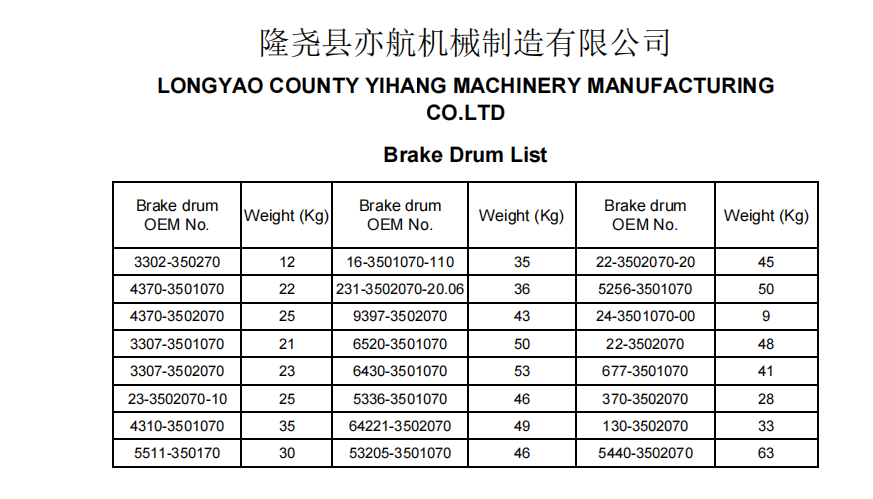Sep . 12, 2024 09:26 Back to list
How Often to Replace Brake Drums - Essential Guide for Vehicle Maintenance
How Often to Replace Brake Drums
Brake drums are a crucial component of a vehicle's braking system, particularly in drum brake setups. As with all parts of your vehicle, wear and tear is inevitable over time. Understanding how often to replace brake drums can help ensure your vehicle remains safe and performs optimally.
Typically, the lifespan of brake drums can vary based on several factors, including driving habits, vehicle type, and overall maintenance. In general, brake drums should be checked every 30,000 to 60,000 miles. However, rather than relying solely on mileage, it is essential to pay attention to the symptoms that indicate it might be time for a replacement.
One of the first signs of worn-out brake drums is a decrease in braking performance. If you notice that your vehicle takes longer to stop or the brakes feel less responsive, it may be time to have your brake system inspected. Additionally, if you experience unusual noises when braking, such as grinding or squeaking, this can indicate that the brake shoes are worn down—potentially damaging the drums.
how often to replace brake drums

Another factor to consider is the condition of your vehicle’s brake shoes. If the shoes are replaced but the drums are not, the new shoes might wear unevenly. For optimal performance, ensure that both components are maintained in tandem to prevent further damage and costs down the line.
Environmental factors can also impact the lifespan of brake drums. Vehicles driven in hilly areas or those that regularly tow loads may experience more strain on their braking systems, leading to more frequent replacements. Harsh weather conditions can also contribute to wear; for example, road salt used in winter can lead to corrosion.
Regular maintenance is key in extending the life of brake drums. Have your brakes inspected at regular intervals as part of your routine vehicle maintenance. During these checks, a qualified mechanic can assess the condition of both the drums and shoes, measuring their thickness and checking for any irregularities.
In conclusion, while there isn't a definitive rule for when to replace brake drums, keeping an eye on your vehicle's performance and scheduling regular maintenance can help you gauge when it's necessary. Remember, safety is paramount when it comes to brakes; ignoring signs of wear can lead to more severe (and costly) issues. By staying proactive about your brake system's health, you can ensure safe driving for yourself and others on the road.
-
Brake Drum Man - High-Quality Drum Brake Drums & Brake Shoes for Reliable Performance
NewsJun.24,2025
-
High-Quality Brake Drum Kamaz – Durable Drum Brake Drum & Brake Shoe Replacement
NewsJun.10,2025
-
High-Quality Brake Drum Liza for Drum Brake Systems - Superior Durability and Performance
NewsJun.10,2025
-
High-Quality Brake Drum Kamaz – Durable Drum Brake Drum & Brake Shoe Solutions
NewsJun.10,2025
-
Durable Kamaz Brake Drums High-Performance Truck Parts
NewsJun.09,2025
-
Premium Brake Drum Maz Kit with Shoes Enhanced Braking
NewsJun.09,2025
